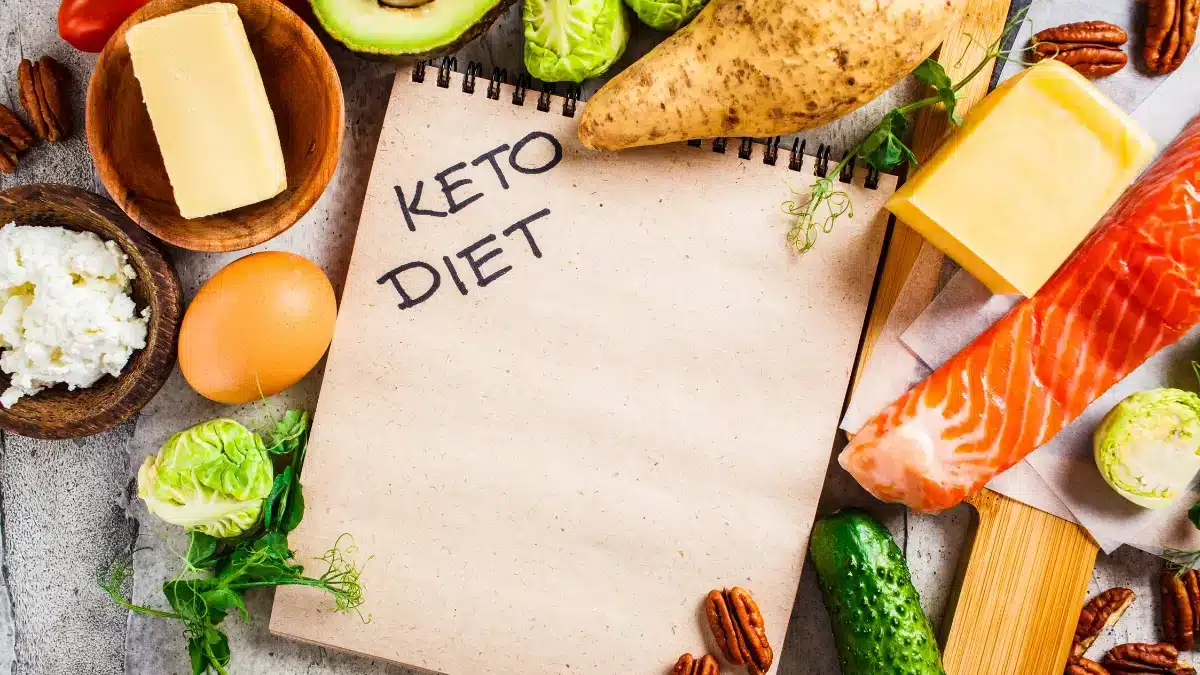Keto Hair Loss: Understanding the Causes, Symptoms, and Treatment
The Ketogenic diet, a low-carbohydrate, high-fat diet, has been popular recently due to its health benefits.
These include weight loss and improved metabolic function.
However, some individuals experience an unwanted side effect known as Keto hair loss.
Keto hair loss usually happens around 2-4 months after starting the Ketogenic diet and can last for several months before the hair regrowth cycle normalizes.
This article examines the causes, symptoms, and potential remedies for Keto hair loss.
What is Keto hair loss
Following a Ketogenic diet can cause temporary hair loss, known as Keto hair loss, which often causes Telogen Effluvium.
Telogen Effluvium is a temporary hair loss condition which is caused by sudden stress or change in the body.
It disrupts the natural hair growth cycle, leading to increased hair follicles entering the resting phase (Telogen) prematurely.
As a result, noticeable hair shedding and thinning may occur.
Symptoms of Keto hair loss

Individuals experiencing Keto hair loss may observe the following symptoms.
- Receding hairline, particularly around the temples or frontal area of the scalp
- Hair strands become more fragile and prone to breakage, resulting in shorter or uneven hair length
- Scalp tenderness, itching, or irritation accompanying the hair loss
- Hair texture may undergo alterations, such as becoming more brittle, dry, or lacking shine
- New hair growth may appear sparse or thinner than usual, contributing to an overall reduction in hair volume
Causes of Keto hair loss
Several factors contribute to the occurrence of Keto hair loss, such as.
Nutrient deficiencies
The Ketogenic diet restricts certain carbohydrate-rich foods, which may limit the intake of essential nutrients necessary for healthy hair growth.
Inadequate consumption of nutrients like biotin, zinc, and vitamin D can impact hair health and contribute to hair loss.
Rapid weight loss
Weight loss, mainly when it occurs rapidly, can trigger Telogen Effluvium.
The body interprets sudden weight loss as a stressful event, diverting resources from hair growth to prioritize vital functions.
This shift disrupts the hair growth cycle, leading to temporary hair loss.
Stress and hormonal changes
Transitioning to a new diet, including the Ketogenic diet, can cause physical and emotional stress.
Stress hormones, such as cortisol, disrupt the hair growth cycle and contribute to hair loss.
Additionally, hormonal changes associated with the Ketogenic diet, such as Insulin and Androgen level fluctuations, play a role in Keto hair loss.
How to prevent hair loss on Keto diet
Although Keto hair loss can be distressing, it is often temporary and can be managed effectively.
Here are some treatment and prevention strategies.
Balanced nutrient intake
Ensure you are obtaining adequate nutrients by following a well-rounded Ketogenic diet.
Incorporate nutrient-rich foods, like leafy greens, nuts, seeds, and lean proteins.
If necessary, consider supplements under the guidance of a healthcare professional.
Gradual transition
Ease into the Ketogenic diet gradually, allowing your body to adapt more smoothly.
This approach can help minimize the stress response and potential hair loss.
Stress management

Implement stress-reducing techniques, such as exercise, meditation, deep breathing, and sufficient sleep.
These practices can promote overall well-being and support healthy hair growth.
Professional guidance
If hair loss persists or worsens, seek medical advice from a dermatologist or healthcare professional experienced in hair disorders.
They can evaluate your situation, provide targeted recommendations, or explore other underlying causes for hair loss.
Conclusion
Keto hair loss is a temporary side effect that some individuals may experience when following a Ketogenic diet.
Nutrient deficiencies, rapid weight loss, stress, and hormonal changes are among the factors contributing to this phenomenon.
But by maintaining a balanced nutrient intake, transitioning gradually, managing stress levels, and seeking professional guidance if needed, hair loss can be minimized.
Remember, patience is the key, as hair growth cycles can take several months to normalize.
Frequently Asked Questions
Is Keto hair loss permanent?
No, Keto hair loss is not permanent. It is a temporary condition where hair follicles prematurely enter the resting phase and shed more than usual. Hair regrowth occurs once the underlying causes, such as nutrient deficiencies or stress, are addressed and the body adjusts to the Ketogenic diet.
Can hair loss be a side effect of the Keto diet?
Yes, a Keto diet can result in hair loss. The changes in nutrient intake, rapid weight loss, and potential stress associated with transitioning to a Ketogenic diet can disrupt the hair growth cycle, leading to temporary hair loss. It is crucial to note that the severity of hair loss can vary amongst individuals.
Is Keto hair loss reversible?
Yes, Keto hair loss is generally reversible. Once the body adapts to the Ketogenic diet, nutrient levels stabilize, and any underlying factors contributing to hair loss are addressed, the hair growth cycle typically returns to normal. Hair regrowth can occur, and the density and volume of hair should improve over time.
Can Keto hair loss affect both men and women?
Yes, Keto hair loss can affect both men and women. Hair loss causes, such as nutrient deficiencies and stress, can impact regardless of gender. Both sexes can experience temporary hair loss, though there may be differences in how men and women display their hair loss and how severe it is.
How can I reduce my hair from falling out on Keto?
To minimize hair loss while following the Keto diet, it is essential to focus on proper nutrient intake. Include a variety of nutrient-rich foods such as green leafy vegetables, lean proteins, nuts, and seeds. Gradually transition to the Keto diet to avoid rapid weight loss and reduce stress on the body.
WowRx uses only high-quality sources while writing our articles. Please read our content information policy to know more about how we keep our content reliable and trustworthy.






